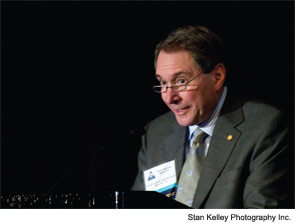
MIAMI BEACH — Robert Ossoff, DMD, MD, said he “never in a million years,” as a young doctor, thought that he would be standing at a podium giving the presidential address to the Triological Society.
Now that he holds the position of society president, he can’t believe how much time has flown by. “Who would have ever appreciated how quickly the years would pass to get here?” Dr. Ossoff, executive medical director of the Vanderbilt Voice Center, told his audience on Jan. 26 at the Triological Society Combined Sections Meeting.
But that quick pace, he said, has brought to mind an issue that is often acknowledged by otolaryngologists as important but is not meaningfully acted on: finding a balance between work and other pursuits. Dr. Ossoff said that an off-kilter work-life balance is a significant problem and encouraged his colleagues to “prioritize goals to reflect professional and personal values [and] consciously set realistic expectations for yourself and others.”
Dr. Ossoff said that the job itself lays the foundation for a life that includes too much work and too little outside of work.
“Our profession sets us up to live in disequilibrium,” he said. “We have a long history of being lured into setting extremely high expectations of ourselves; in fact, anything less than perfection often sends us into a downward spiral.”
Challenging Schedules
Even for those who try to find this balance, there are tough challenges.
“As physicians, our work-life balance is so unpredictable,” he said. “We get caught up in life-and-death decisions. We take a call and unexpectedly return to the operating room.”
Technology has only added to the challenge, he said.
“Being at home today does not mean we are not at work: Technology advances have obliterated the boundary between work and home,” whether it’s a text message to a member of your family from grand rounds or following up with a patient from the symphony.
The frequent result of a lack of balance is burnout, which Dr. Ossoff described as a “state of fatigue brought about by a devotion to a cause, way of life or relationship that fails to produce the expected rewards.”
That can lead to feelings of helplessness, detachment, cynicism and negativity, which can all lead to other, more concrete problems.
“The costs of burnout are absenteeism, turnover, errors and an increase in malpractice cases,” he said. “More specifically, work satisfaction and marital satisfaction take a significant hit. And quality of life is markedly diminished.”
Solutions
Striking the balance takes a conscious effort, including planned flex time, setting realistic deadlines and doing personal things that can be overlooked, like exercising and getting medical care for yourself.
“Delegate some of your responsibilities to others,” Dr. Ossoff said. “This will create time in our schedule and allow others to grow professionally and operationally. This also assists in succession planning by helping others to learn how to perform the job when you’re gone. Who knows? They may actually do better.”
Dr. Ossoff said that although otolaryngology is “a wonderful profession that brings us tremendous personal gratification,” there has to be flexibility.
“Creating a balance between work and life requires you to develop a flexibility to juggle the demands of work [and] personal and family life so that we can keep the ball in the air and not drop one or the other,” he said. “No one promises us tomorrow. Please make sure you take the time to smell the flowers, enjoy the sunrise and the sunset and the beauty in between. And appreciate what we have been given.”
Otolaryngologists Respond
Greg Wiet, MD, an associate professor of otolaryngology and biomedical informatics at the Ohio State University College of Medicine who practices at Nationwide Children’s Hospital in Columbus, Ohio, said not finding the right balance can lead to, “very subtly, over time, dissatisfaction with your career and a lack of motivation and (low) morale.”
Relying on colleagues is an important part of trying to find that balance, he said.
“There’s not a time off where someone’s not going to be sick or someone’s not going to need a physician—I mean, that happens 24/7,” he said. “So the key is trying to arrange a balance in your life with coverage with other people instead of all of this ‘I can do it all myself’ attitude.”
Donald Annino, Jr., MD, DMD, an assistant professor of surgery in the division of otolaryngology at Harvard Medical School who practices at Brigham and Women’s Hospital in Boston, said he is somewhat lucky in that his wife is an academic otolaryngologist at the same place, making it easier to manage schedules so that they can spend time with their children and each other.
“If you don’t do that, your home life suffers probably even more so than your professional life,” he said. “But they’re both interconnected, and if you’re not happy in one you won’t be happy in the other.”
Leave a Reply